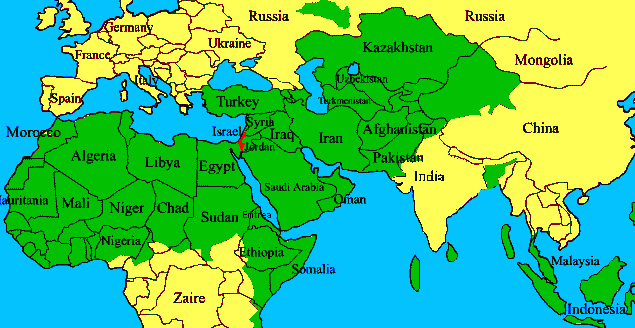The New York Times has a long and well-established history of contempt for the state of Israel and for anything on her side of Israeli-Palestinian (and more broadly, Israeli-Arab) issues. Her editors had a bridge-too-far moment this past week when they ran a cartoon depicting a blindered, yarmulke-wearing Donald Trump being led by a long-bodied dog with the face of Benjamin Netanyahu and a Star of David around its neck. Supposedly, this cartoon was meant to assert that Netanyahu is running Trump’s Middle-East politics. The fact that its imagery echoes countless historical examples of blatant anti-Semitism seemed to have initially escaped the notice of the Times editors, who picked it up from a wire service, and who have been subsequently driven to red-faced apologies by the strong and wide-spread backlash.
The cartoonist attempted to defend himself and his work, suggesting that the cartoon was commentary about nations and their leaders, and that he has “nothing against the Jews.” And, as sure as the sun will rise, social media contrarians have emerged in defense of the image, making all the usual statements about the distinction between Jews and Israel.
Yes, clearly and obviously, one can criticize the actions of a nation and its leadership without bigotry against a people, a religion, an ethnicity, a race, and so forth. It’s too often the case, however, that this fact is used as cover for underlying bigotry against Jews in the case of Israel critique.
 The disproportionate ire, near to the point of obsession, found in such esteemed places as the New York Times (and by extension much of the liberal press) and the United Nations, among others, given that Israel is a mere speck in a sea of Muslim lands, and given that her population of 8.7 million (with nearly 1 in 5 being Muslim) is dwarfed by the 400+ million in the Arab nations (and the 1.8 billion Muslims worldwide), speaks of something beyond mere national and international politics (and that’s before we even start to compare the relative states of individual rights and liberties in Israel vs, say, Saudi Arabia).
The disproportionate ire, near to the point of obsession, found in such esteemed places as the New York Times (and by extension much of the liberal press) and the United Nations, among others, given that Israel is a mere speck in a sea of Muslim lands, and given that her population of 8.7 million (with nearly 1 in 5 being Muslim) is dwarfed by the 400+ million in the Arab nations (and the 1.8 billion Muslims worldwide), speaks of something beyond mere national and international politics (and that’s before we even start to compare the relative states of individual rights and liberties in Israel vs, say, Saudi Arabia).
And, yes, clearly, the fact that Jerusalem is the center of three major religions elevates Israel’s relevance well above the empty sands of southern Algeria, Libya, and Egypt, but this and countless other excuses for the grossly disproportionate on Israel nevertheless carry an undercurrent of anti-Semitism.
Still, it’s unjust to declare anti-Israel attitudes equivalent to anti-Semitism. One can have massive issues with the state of Iran without being anti-Shia or anti-Muslim. It’s not hard to separate the two, if one truly has distinct feelings. It starts with a simple question:
Does Israel have the right to exist?
It’s a simple yes-no question, and can be answered without equivocation, without qualification, and without whataboutism. Borders, a two-state solution, Jerusalem, disputed lands, settlements, the West Bank, the Golan Heights, Gaza, military actions and responses, treatment of in-country Muslim minorities, and other issues can all be discussed and (vociferously) debated after a simple yes-no response to that question, and without one’s positions being undermined by a “yes” response.
Decades back, when Yasser Arafat was the face of the Palestinians, I considered it big deal that he would never affirm Israel’s right to exist in Arabic, speaking such words only in English or other secondary languages. Many asserted duplicity on his part, under the taqiya principle, suggesting that his failure to speak of Israel’s right to exist in Arabic was deliberate and a message that all concessions made in negotiations were secondary to the desire to see Israel removed from the map.
So, the simple yes-no question is fundamental. I can imagine the possibility that someone who says “no” might not be anti-Semitic, might not have an inherent bigotry against Jews in general, but given the realities of both history and the modern world, color me skeptical, and you’d have to do a lot to convince me that believing Israel has no right to exist does not include an underlying bigotry against Jews.
How many out there would assert that Iran has no right to exist, or Syria, or Saudi Arabia? How about Montenegro, or Serbia, or East Timor, or Kosovo. How about the good old United States of America? I’ve seen “whataboutist” responses about America’s theft of America from the natives, but I doubt whether those folks would assert “no right to exist” for both America and Israel, as implied by their tu quoque dodge.
The cartoon the Times ran was indefensible, unless your defense is that you don’t like Jews. The editors deserve the backlash, and maybe they’ll learn a lesson (yeah, right). While I’ve seen no indication (not that I’ve looked too deeply) that the Times itself has rejected Israel’s right to exist, controversies such as the one it self-inflicted are opportunities to challenge the true beliefs of those who’d defend what the paper itself has now rejected.
If you can’t answer “yes” to one simple question, but don’t consider yourself anti-Semitic, I’d love to hear the explanation.


Does Israel have the right to exist, and does the right of return nullify that right?
Please elaborate on the second part?
The concept that the “Palestinians” who were forced out/left voluntarily during the lead up to the Six Day War (and the one in 1948) have the right to return to what is now Israel and assume the right to vote and thus change the government.
Wouldn’t granting this, and allowing the change of government basically cause Israel (as we know it) to cease to exist.
It seems to me that it would.
Since the ’67 territory was taken after a defensive measure against the nation’s those returning were a part of, it seems far more reasonable to have Israel pay reparations for taking the property and keeping those residents in the territory of the nation they lived in.